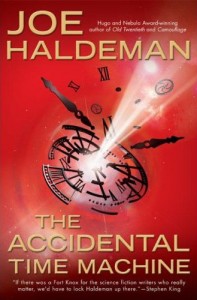 What would you do if you had a time machine? Admittedly, it’s somewhat limited: it only goes forward, and every time it’s used, it leaps forward at an exponential rate. At first it leaps forward by seconds. Then minutes. Use it too many times, and you’ll leap forward by centuries, even millennia. What would you do?
What would you do if you had a time machine? Admittedly, it’s somewhat limited: it only goes forward, and every time it’s used, it leaps forward at an exponential rate. At first it leaps forward by seconds. Then minutes. Use it too many times, and you’ll leap forward by centuries, even millennia. What would you do?
That’s the question Matt Fuller has to answer when he accidentally invents a time machine while working as a grad student at MIT. At first it’s a curiosity. Then a breakthrough. And then, as he experiments, it becomes inviolably intertwined with his life, as he’s blamed for an accidental death which occurs during testing. At that point, he has no choice but to leap forward, into a strange new future. And, just like with H.G. Wells’s protagonist in the original Time Machine, Matt Fuller is repeatedly exposed to the strange ways in which the future might unfold.
A time where Matt is a hero, but everyone he has known or cared for are much older, and society is different, yet still eerily familiar. But when things get uncomfortable, Matt realizes that his time machine is also the ultimate escape, a way to leave behind his problems.
A society ruled by religion, a strange blend of high and low technology, where Matt might fit in if he can just learn to adapt. But this society has its own problems, and Matt has no intention of being struck in it forever. What lies ahead, though? It’s here, however, that he picks up a traveling companion, an intelligent young lady whose ways are very different from what he’s used to.
A utopian world where bartering is an art form, and Artificial Intelligences are commonplace. But is there any place for Matt and his companion, Martha, here? All they have to do is push a button, and find out…
Ultimately, Matt and Martha do reach their ultimate destination, only to discover that it’s not what they were expecting. In fact, it’s not what anyone was expecting. History, it seems, repeats itself.
The Accidental Time Machine is a fascinating extrapolation of the future in the way only Joe Haldeman, who has explored this concept before in The Forever War, can do. It’s a relatively swift read, and I found it hard to put down once I’d started, eager to find out what mess our hero would get into next. Haldeman’s look at these societies of the centuries to come is intriguing, and even plausible, although I’m honestly sorry he didn’t spend longer in some of them. As soon as we got comfortable, he was off again to the next one. I’d have enjoyed seeing Matt stay longer in the future theocracy (where Jesus literally rules) and the future barterocracy (for lack of a better word) as they both held a lot of promise. The deus ex machina which comes into play near the end didn’t light my fires either; it reminds me a little too much of the god-like figure which dominated the end of Forever Free (his sequel to The Forever War). I don’t know what exactly I was expecting; after all, we knew the trip was one-way and if Matt was ever to return to the past (something that was quite broadly suggested to have happened) he had to encounter something capable of reversing the process. I guess it all seemed to end rather abruptly where that point was concerned. This book could have been longer by several hundred pages and I would have been happy.
In general, I really enjoyed The Accidental Time Machine. Haldeman has some great ideas, and a fairly good follow through on some of them, but he failed to utilize their full potential. This was a good book, but I know he’s capable of more. After all, The Forever War remains one of my very favorites for a reason. I’ll recommend this book, but not as enthusiastically as I’d originally hoped. Here’s hoping his next offering lives up to our high expectations.
Originally posted on SF Site, 2007
